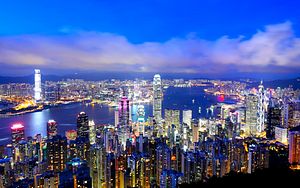In a landmark for Asia, Hong Kong has been named the world’s most competitive economy for 2016, moving from second place last year to push the United States into third spot behind Switzerland.
But while Asia might top the world in business, a separate report has shown the Nordic nations lead in life satisfaction, basically equated to being healthy and having a good job.
In its annual report, the IMD World Competitiveness Center announced May 30 that the “sheer power” of the world’s biggest economy was no longer sufficient to make it the strongest competitor, with the United States dropping two places in the rankings.
Center director Arturo Bris said a consistent commitment to a favorable business environment was central to Hong Kong’s rise up the rankings, with the Chinese special administrative region earning praise for its encouragement of innovation through low, simple taxation and openness to capital flows.
Hong Kong “also offers a gateway for foreign direct investment in China mainland, the world’s newest economic superpower, and enables businesses there to access global capital markets,” the Switzerland-based Center said.
Singapore dropped one place to fourth, with the two Southeast Asian nations’ the region’s only top 10 representatives among the 61 economies surveyed on factors including business and government efficiency, economic performance and infrastructure.
However, Australia and New Zealand both gained a single place, with the Kiwis moving to 16th, one spot higher than their trans-Tasman rivals. Japan also gained a spot to 26th, indicating that Abenomics still has plenty of work to do on structural reform, while Thailand advanced two places to 28th.
Elsewhere though, the news was not so positive for Asia, with a number of nations suffering significant falls compared to the 2015 report.
Among them, Indonesia slipped six places to 48th, Malaysia dropped five spots to 19th, South Korea fell four places to 29th and Taiwan eased three spots to 14th, while the Philippines slipped a single place to 42nd.
China only narrowly retained its placing in the top 25 after falling three places on last year’s ranking, while Mongolia suffered a similar fall to rank second-last overall, only ahead of Venezuela.
“One important fact that the ranking makes clear year after year is that current economic growth is by no means a guarantee of future competitiveness,” Bris said.
“Nations as different as China and Qatar fare very well in terms of economic performance, but they remain weak in other pillars such as government efficiency and infrastructure.”
Bris also pointed to the issue of the growth in income inequalities among countries since 1995, since “wealth accumulation by the rich doesn’t yield any benefits for the poor in the absence of proper social safety nets.”
Nordic Nations Happiest
But while Hong Kong can bask in its economic competitiveness, the citizens of Denmark, Norway and other Nordic nations as well as Switzerland, New Zealand, Canada and Australia rank highest in life satisfaction, according to the OECD.
The latest edition of the Paris-based economic organization’s “Better Life Index” found that being healthy and having a good job are two of the key ingredients associated with “subjective” well-being, along with having a satisfactory “work-life balance” and personal safety.
Covering 38 nations, the index found that “the good economic performance of a country does not necessarily mean an equally good performance across the spectrum of well-being indicators.” Countries with varied economic performance, such as Hungary, Italy and Ireland, were above average in work-life balance, while Japan and South Korea were among those with the “best general levels of education and skills.”
For the Asia-Pacific, Japan ranked at the top in personal security and above-average in income and wealth, education and skills, jobs and earnings and social connections. However, it scored below average on civic engagement, housing, subjective well-being, work-life balance and health, with those Japanese surveyed ranking their life satisfaction at 5.9, below the OECD average of 6.5.
South Korea achieved above-average rankings in civic engagement, education and skills, personal security, jobs and earnings, but was below average in income and wealth, subjective well-being, environmental quality, health status, social connections and work-life balance. While ranking highest in the OECD for students’ skills, the level of atmospheric pollutants (PM2.5) scored the worst, and Koreans were gloomier than the Japanese, ranking their life satisfaction at just 5.8.
Further south, perhaps reflecting their recent economic good fortunes, the Aussies were happier, scoring themselves 7.3 on the life satisfaction scale. This was likely aided by having $33,138 per capita annual household disposal income, above the OECD average of $29,016.
Across the ditch, the Kiwis scored themselves even higher, ranking 7.4 on the life satisfaction scale on the back of their leading health and social connections rankings, only scoring below average in income and wealth.
Overall though, the average OECD citizen is doing better now than in 2009, but changes in well-being have been mixed, both across countries and among the 11 different indicators measured.
“Household income has begun a slow recovery from crisis levels in most OECD countries, but progress in other areas (such as long‐term unemployment, long working hours, and voter turnout) has failed to keep pace in several cases,” the organization said.
“Countries experiencing the most severe declines in household income since 2009 (such as Greece, Portugal, Italy and Spain) continue to feel the pain in other ways, ranging from high joblessness and reduced earnings, to less affordable housing.”
In addition, regional disparities in both quality of life and material conditions within countries are often quite large, as seen in the case of Italy and Spain, where the difference between the jobless rate in the best and worst-performing regions was close to 20 percentage points.
The lesson from the latest data for the Asia-Pacific: choose Oceania if you are looking for a better lifestyle, but Hong Kong or Singapore if you want a more competitive business. Sometimes it is not always possible to have your cake and eat it, unless you enjoy frequent flying.

































